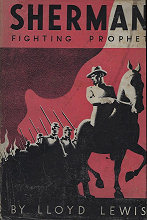
LEWIS : Sherman : fighting prophet (előszó)
THE MOTTO OVER THE DOOR
CHRISTMAS was at hand, and the cadets of the Louisiana State Seminary of Learning and Military Academy had departed for their homes, all alight with the emotions of approaching vacation. Up the steps of the main building came a man with the United States mail. He passed in at a door over which stood a marble motto—"By the liberality of the General Government. The Union—Esto Perpetua."
Newspapers came to the private room of the superintendent, a tall, spare man red of hair, red of beard. The superintendent fixed his bright eyes upon words on a page—"South Carolina has seceded from the Union." The thing had been done at half-past one in the afternoon of December 20 in the year 1860. All at once William Tecumseh Sherman began to weep. He leaped to his feet and paced his office with the long, quick steps of a man who all his life would walk out his troubles—the swift steps of a soldier who must be marching, marching till a job was done.
He loved the South. Since his sixteenth year his closest male friends had been Southerners. Now that he was forty his Ohio boyhood seemed far away. Of the twenty-five years that had elapsed since he had left home practically all had been spent under the social influence of the South—four years in the United States Military Academy where Southern ideals ruled—six in the enamoring charm of Florida and South Carolina—four as the intimate of Southern-born army officers in California—two in army posts at St. Louis and New Orleans—six representing Missouri bankers—some scattering months in Kansas and Ohio and now this last year as superintendent of an academy in Louisiana.
The South had put its stamp upon him. Outside the windows, carpenters even now were building him a home in which he had dreamed he would spend the rest of his life with his family. Across the South, his old army comrades were, he knew, preparing to follow South Carolina's lead. But Sherman could not go along. Something was holding him back —and it was not slavery, for he approved that. It was the sign over the door: "The Union—Esto Perpetua."
With the pacing superintendent in his room, this December day, was his professor of ancient languages, a Southerner to whom Sherman talked as if, indeed, this one individual were the whole South. "South Carolina," said the superintendent, "has precipitated war."
"If you leave the Union the North must fight you for its own preservation."
The South would drench the country in blood. Talking, marching, weeping! . . .
"Oh, it is all folly, madness, a crime against civilization! . . . I must fight your people, whom I love best."
Southerners, he said, knew nothing of war's terrors. They did not understand that war meant months of suffering for every day of glorious fighting. Did they realize that more men would die of disease than of battle wounds? How could they fail to understand that in all history no nation of mere agriculturists had ever won against a nation of mechanics?
"You are bound to fail!"
Within three weeks the superintendent had resigned. To the Governor of Louisiana he said:
"I prefer to maintain my allegiance to the Constitution as long as a fragment of it survives."
The crisis had awakened the one religion that he, in seventy long years of life, would own—love of the Union, a faith given him in part by heredity but more by environment, the environment shaped for him by Thomas Ewing, sometimes known as the Bishop, the Salt-Boiler, Old Solitude, and the Nestor of the Ohio Bar.